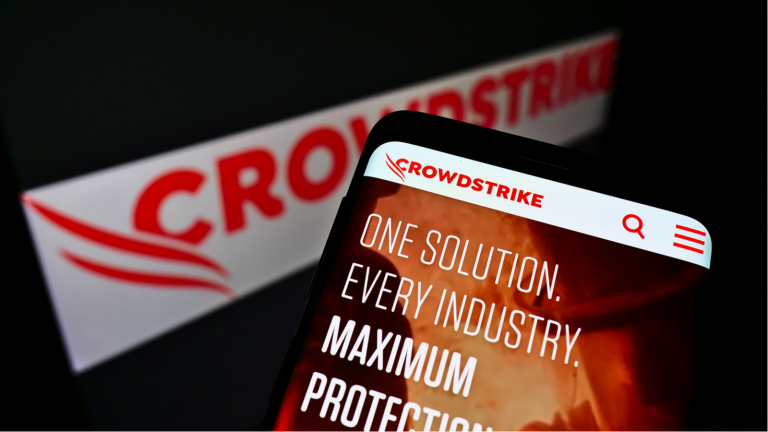The market doesn’t trust CrowdStrike (NASDAQ:CRWD) anymore. Following its software patch that caused IT systems worldwide to meltdown, the cybersecurity stock lost all of the gains it made in 2024.
Before the CrowdStrike outage, its stock had surged 52% but subsequently lost one-third of its value. Nearly $30 billion in market valuation evaporated. CRWD stock now trades at $256 per share.
Beyond the monetary value of CrowdStrike’s outage, it may have damaged its reputation. That could hurt its ability to gain new customers. A cybersecurity outfit opening a global hole in customer databases even if no hack actually occurred still isn’t a good look.
Yet it also creates a wedge its rivals could use to steal customers and market share from the industry leader. According to 6Sense, CrowdStrike is the top cybersecurity firm with a near 24% share followed by privately held McAfee at 21%.
Although this is likely a relatively fleeting hiccup for the company precisely because no hack actually happened, it still represents a chance for the following three cybersecurity stocks to gain market share.
SentinelOne (S)

SentinelOne (NYSE:S) is the third largest cybersecurity firm, though it is a distant third with less than 10% of the market. While its stock is down 16% year-to-date, it has jumped 12% since the CrowdStrike outage. However, it was moving higher beforehand and is 66% above its June lows.
First-quarter revenue increased 40% year-over-year to $186 million. The number of large clients with more than $100,000 in annual recurring revenue (ARR) grew 30% to 1,193 from last year. SentinelOne customers with more than $1 million in ARR reached a new record. Management reported achieving free cash flow (FCF) Rule of 58 as it became FCF positive well ahead of schedule.
The Rule of 58 means SentinelOne’s FCF margin was 58% after accounting for operating cash flows and capital expenditures. CEO Tomer Weingarten said, it “shows that SentinelOne represents a rare combination of premium growth and returns.”
Profits keep expanding as well. The first quarter was the cyber outfit’s 11th consecutive quarter with over 25 points of operating margin expansion.
Fortune 100 companies make up a good percentage of SentinelOne’s enterprise customers. If they are leery after the CrowdStrike outage, they just might join their peers at SentinelOne.
Palo Alto Networks (PANW)

Cybersecurity expert Palo Alto Networks (NASDAQ:PANW) overcame concerns in February over slowing growth and its switch to a single, overarching platform that caused its stock to drop sharply. It has clawed back to a 10% gain so far this year but remains 14% below those earlier highs.
By offering clients a broad range of tools that holistically protects assets across their network, cloud and at the edge, the comprehensive package of security operations creates a stickiness and gives it a competitive advantage. Rather than customers choosing vendors for specific tasks, Palo Alto Networks gives them platforms to handle a variety of tasks under an overarching umbrella.
It calls this strategy “platformization” and acknowledges the concern it created. But its individual Prisma, Cortex and network security platforms also allows the cybersecurity firm to cross-sell and upsell clients additional protection modules.
Fiscal third-quarter revenue grew 15% in May while adjusted profits grew 20% to $1.32 per share. As clients consolidate their cybersecurity spending, Palo Alto Networks will benefit as they choose this platform approach to protection.
First Trust NASDAQ Cybersecurity ETF (CIBR)

Choosing one stock, or even a couple, to benefit from the CrowdStrike outage, isn’t easy. So why not buy all of them? That’s what an investor can do by buying First Trust NASDAQ Cybersecurity ETF (NASDAQ:CIBR). Buying a basket of stocks through the exchange-traded fund (ETF) ensures your portfolio of scooping up all the winners.
It is the largest ETF focusing on cybersecurity stocks and tracks the performance of the NASDAQ CTA Cybersecurity Index. While it does own CrowdStrike as one of its 29 holdings, it is not the ETF’s biggest. It comprises just 6% of the portfolio’s holdings, only the fifth largest position.
The three largest are Infosys (NASDAQ:INFY), Broadcom (NASDAQ:AVGO) and Palo Alto Networks at 10.2%, 8.5% and 8.3% of the total, respectively. With a 0.59% expense ratio, the ETF trades at over $55.50 per share. It is up 3% YOY but 20% higher over the last 12 months.
On the date of publication, Rich Duprey did not hold (either directly or indirectly) any positions in the securities mentioned in this article. The opinions expressed in this article are those of the writer, subject to the InvestorPlace.com Publishing Guidelines.
On the date of publication, the responsible editor did not have (either directly or
indirectly) any positions in the securities mentioned in this article.
